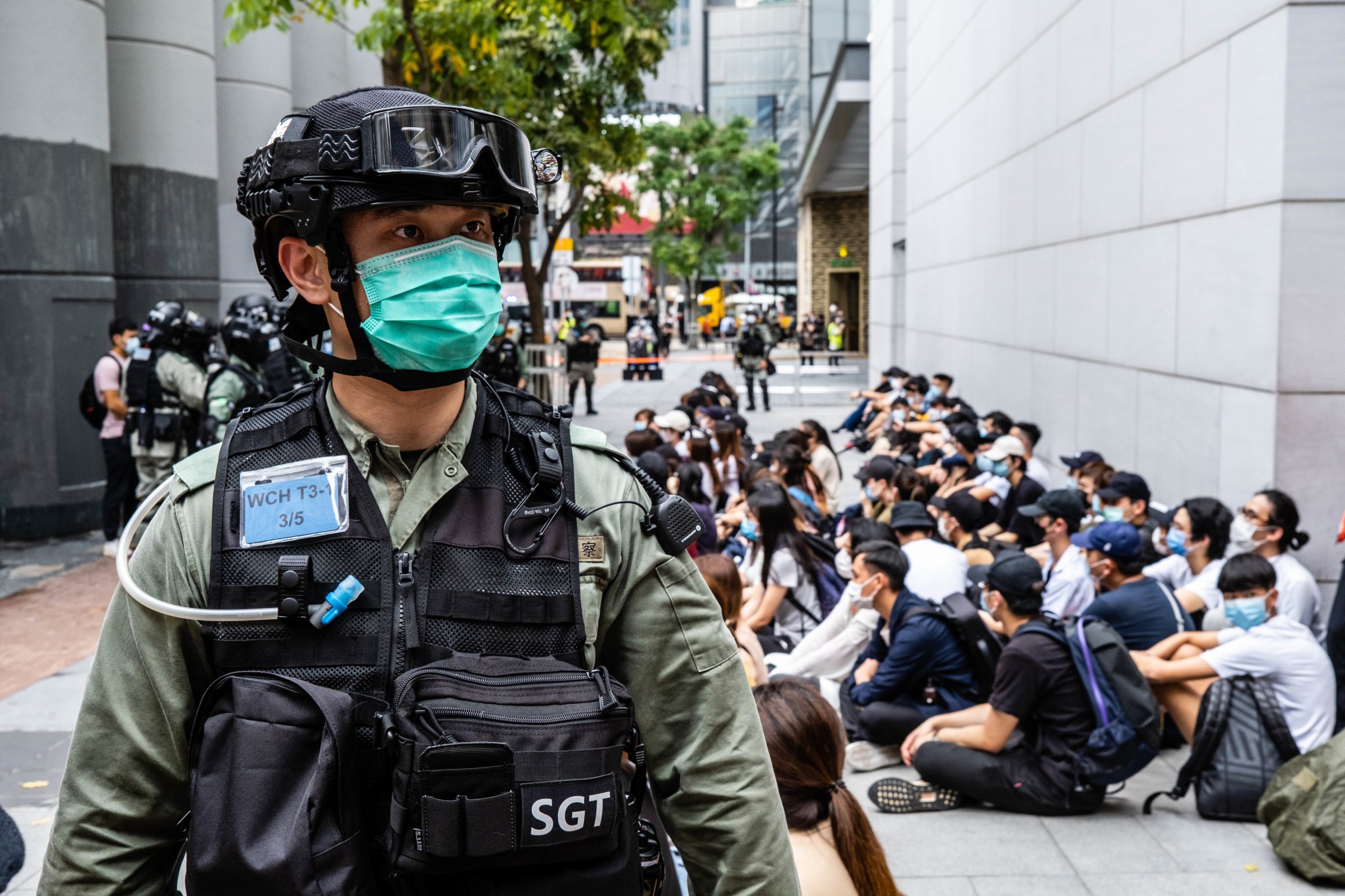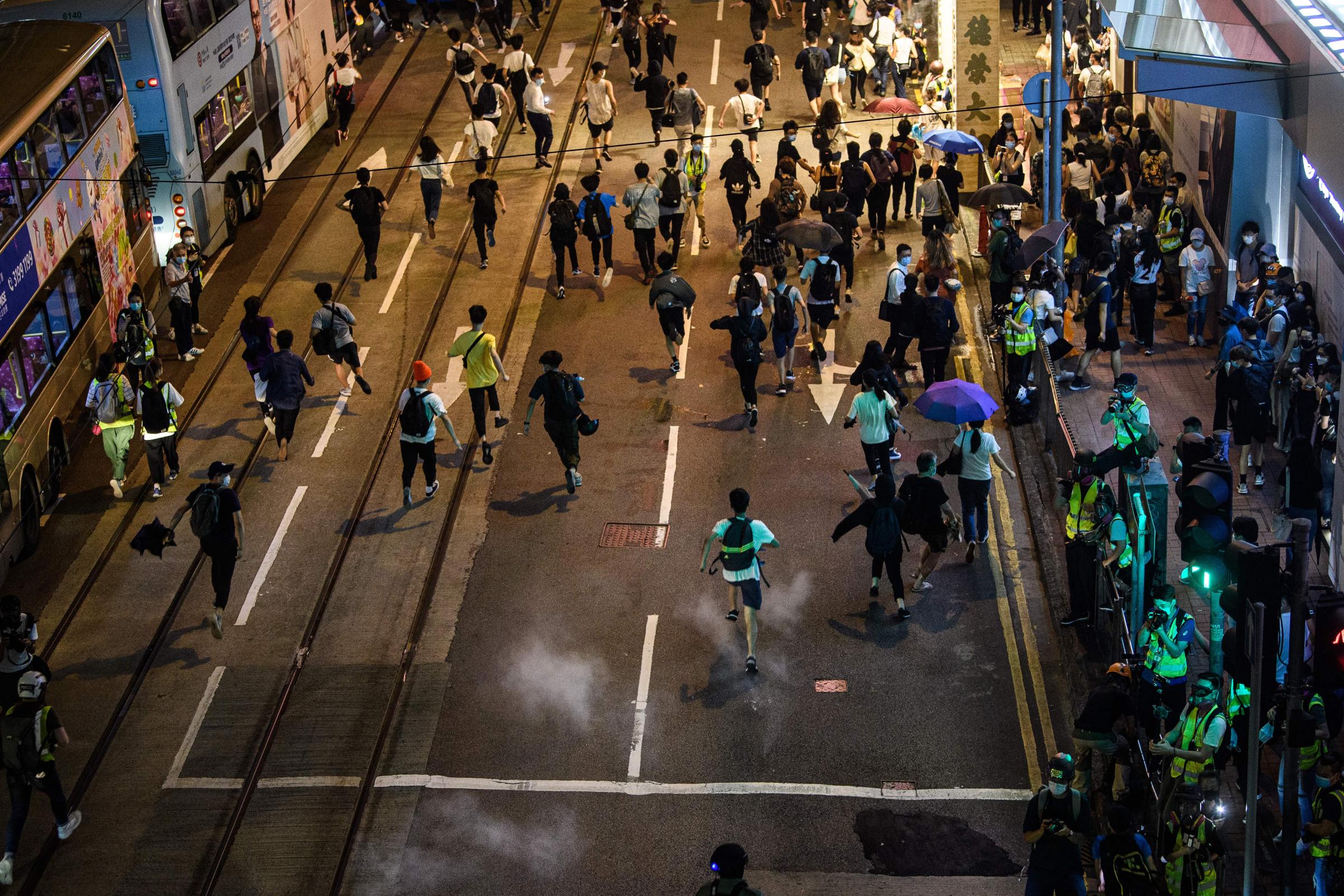
The Trump Administration has frozen funding intended to help people in Hong Kong evade surveillance by the Chinese government, sources with knowledge of the matter tell TIME, just as Beijing prepares to impose a new national security law that protesters fear will erode civil liberties there.
The funding freeze came on June 9, five days after Michael Pack, an ally of President Trump, was confirmed by the Senate to lead the U.S. Agency for Global Media (USAGM), which oversees federal funding of several Internet freedom and foreign news initiatives, including Voice of America and Radio Free Asia.
Senior staff at the agency were informed in an email, obtained by TIME, that Pack had suspended funding on a range of activities at the agency. In the email, USAGM’s chief financial officer Grant Turner cited a request by Pack to immediately freeze “new contracts or extensions of any contract” from the agency’s federal operations and grantees, as well as on new hires and promotions.
The freeze affected several contracts—estimated by two sources with knowledge of them to be worth around $2 million—that would have directly benefited the pro-democracy movement in Hong Kong.
In a statement to TIME, the USAGM did not dispute the $2 million figure, but said that it was committed to defending Internet freedom in the region. “USAGM CEO Michael Pack understands the scale and nature of the threat posed by opponents of freedom of expression, and that is precisely why he considers bolstering [Chinese] firewall circumvention a top priority of his tenure at the agency,” a spokesperson said.
The funds were set to be distributed by the Washington-based Open Technology Fund (OTF), group overseen by USAGM that funds open-source Internet freedom projects around the world. The OTF is officially an independent non-profit, but is funded by Congress with government oversight.
The Trump Administration’s funding freeze came less than a month after the Chinese Communist Party announced plans for a national security law that will make secession, subversion, terrorism and collusion with foreign forces a crime. Pro-democracy campaigners say the law, which is expected to be passed on Tuesday and take immediate effect, will curtail Hong Kong’s autonomy and the freedoms it enjoys that distinguish it from mainland China.
The impending legislation, and another controversial law that criminalizes insulting China’s national anthem, have sparked fresh rounds of unrest in Hong Kong in recent weeks—though protests have so far failed to regain the momentum they had in the second half of 2019.

One of the OTF’s plans ahead of the national security law coming into force in Hong Kong was to set up a cybersecurity incident response team focused on Hong Kong. The team would have analyzed Chinese surveillance techniques, and shared information quickly with developers of secure communications apps after identifying how those techniques are developing, two people with knowledge of the plans said. Those plans were made impossible by the funding freeze.
Another initiative hamstrung by the freeze was the OTF’s approximately $500,000 rapid response fund, designed to provide fast relief for civil society groups, protesters, journalists and human rights defenders who have come under digital attack. The fund is open to applicants from around the world, but has made several payouts to groups in Hong Kong since unrest began there in June 2019. The freeze has so far prevented at least one Hong Kong-related payout from the rapid response fund. That payout was described by two people with knowledge of the plans as being for a large project focused on helping civil society groups in Hong Kong with their digital security.
The OTF is little-known outside the world of open source technology, but its funding has contributed to the development of secure communications tools used by protesters in Hong Kong and around the world. It was a key early funder of Signal, the encrypted messaging app of choice for many Hong Kong protesters. Between 2012 and 2016, it donated nearly $3 million to the development of the encryption protocol the app is built on. (The app has since received at least $50 million in other private investment.) The OTF has also directed funds toward projects dedicated to collecting and preserving information shared on the Chinese social networks Weibo and Wechat before posts are censored. It has also invested more than $6 million in Tor, the encrypted internet service that can mask browsing habits from authorities, popular among dissidents around the world.
“I wouldn’t be surprised if [the freeze] is negatively impacting the Hong Kong protesters and putting them at risk, as well as lots of other folks around the world,” said a U.S. Agency for Global Media official who spoke to TIME on condition of anonymity to protect their employment. “I’m almost certain that they didn’t take into account the timing of the national security law. It was sort of a carte blanche thing on day one and I’m not sure if they are really appreciating the operational impact.”
Many Hong Kongers, especially pro-democracy protesters, already use virtual private networks (VPNs), which can help disguise web browsing habits from authorities, to help circumvent monitoring by police. Additionally, in May, as the news of the national security law was first trickling out, Google searches for “VPN” spiked in Hong Kong. Hong Kong is not subject to the internet censorship of China’s Great Firewall, though some fear the effects the security law will have on digital freedom.
“Hong Kong protesters get really geeky about the tools they use,” says Harvey, a freelance programmer from Hong Kong who has participated in the pro-democracy protests and worked with the OTF in the past. He asked to use a pseudonym to protect his identity. “It’s always looming in the minds of Hong Kongers. It’s a place that has one country, two internets, but everybody is scared that [soon] we won’t.”
U.S. support for the pro-democracy movement in Hong Kong is a touchy subject. During the 2019 protests, protesters openly called for foreign intervention and waved U.S. flags at demonstrations. But the Chinese government has frequently claimed that “foreign forces” are behind the protests. Assistance so far, when it has come, has come from bodies at arm’s length from the U.S. government like the OTF and the National Endowment for Democracy (NED), another non-profit predominantly funded by Congress, which spent about $643,000 on Hong Kong programs in 2019. (These programs are described as fostering civil society in Hong Kong; the NED says it has not sent aid to protesters.) In December, China announced sanctions against the NED and several other U.S-based non-profits for “strongly instigat[ing] extremely violent criminal activities,” according to a Chinese foreign ministry spokesperson. The OTF has so far evaded Chinese sanctions, although activists fear the new national security law could criminalize protesters’ ties with foreign organizations if authorities consider them to be damaging to national security.
But now the OTF finds itself paralyzed by its own leadership at what current and former insiders say is a critical time. With the national security law looming, Hong Kong protesters are “afraid that any speech or activity that they are involved in could be deemed criminal under this new law, because the CCP is very vague in its wording and expansive in its application, historically, of these laws,” says Libby Liu, the OTF’s former CEO, who resigned on June 13 in response to the funding freeze. “We have several projects housed in Hong Kong. So those people could be caught up in the net that says taking U.S. government funds is a subversive behavior, since the CCP has already found those things to fall within subversive activity or a risk to national security.” So far, Beijing has not released the full draft text of the security law.
The June 9 email announcing the freeze on funding included a line asking urgent exemptions to be raised with senior USAGM staff. In response, OTF staff sent an email requesting all their pending contracts, including the Hong Kong funding, be exempted. As of June 25, they had not received a response to their request and the freeze is still in place, two people with knowledge of the matter told TIME.
Four days after she resigned, Liu was fired and prevented from serving her month’s notice, as she had planned. Laura Cunningham, the OTF’s principal director, was also fired. On Tuesday, the OTF filed a federal lawsuit arguing Pack lacked the legal authority to fire OTF staff and freeze funding. In a statement to TIME on Thursday, USAGM declined to comment on the pending litigation, but about Pack’s decision to fire senior staff, said: “All of the actions that CEO Michael Pack took are legal, and he stands by them.”
The firings are part of a broader shakeup at USAGM, in what insiders fear is part of a plan to turn the agency into a more overt propaganda operation for the U.S. government. In early May, Trump criticized Voice of America for what he said was the broadcaster’s failure to take a hard line on U.S. adversaries. He then pushed the Senate, which had delayed approving Pack for the role for two years, to confirm him. Upon his confirmation, Pack also fired the heads of Radio Free Asia, Radio Free Europe, and two of USAGM’s other international broadcasting agencies. The two most senior staff members at Voice of America quit in anticipation of Pack’s arrival. As well as clearing most senior staff, Pack replaced the bipartisan board overseeing the agency and stacked it with conservatives.
“The Trump Administration has, I think, felt like either their positions are not being represented fairly, or that the agency should be doing more advocacy of their positions,” the USAGM official who spoke to TIME on condition of anonymity said. “The fear now is that the political leadership thinks of this more as a messaging tool for the Trump Administration.”
Meanwhile, as opposition to the national security law continues in Hong Kong, a segment of the U.S. government’s behind-the-scenes support has been on pause for more than two weeks. “The people in Hong Kong are so well-prepared,” Liu tells TIME. “They know what the threat is, and they have been protesting for over a year. They are all trying to get ready. And we can’t help them get ready if we can’t be in business.”
With reporting by AMY GUNIA/HONG KONG
Correction, June 26
The original version of this story misstated the date Pack was confirmed by the Senate. It was June 5, not June 9.
More Must-Reads from TIME
- Breaking Down the 2024 Election Calendar
- How Nayib Bukele’s ‘Iron Fist’ Has Transformed El Salvador
- What if Ultra-Processed Foods Aren’t as Bad as You Think?
- How Ukraine Beat Russia in the Battle of the Black Sea
- Long COVID Looks Different in Kids
- How Project 2025 Would Jeopardize Americans’ Health
- What a $129 Frying Pan Says About America’s Eating Habits
- The 32 Most Anticipated Books of Fall 2024
Write to Billy Perrigo at billy.perrigo@time.com